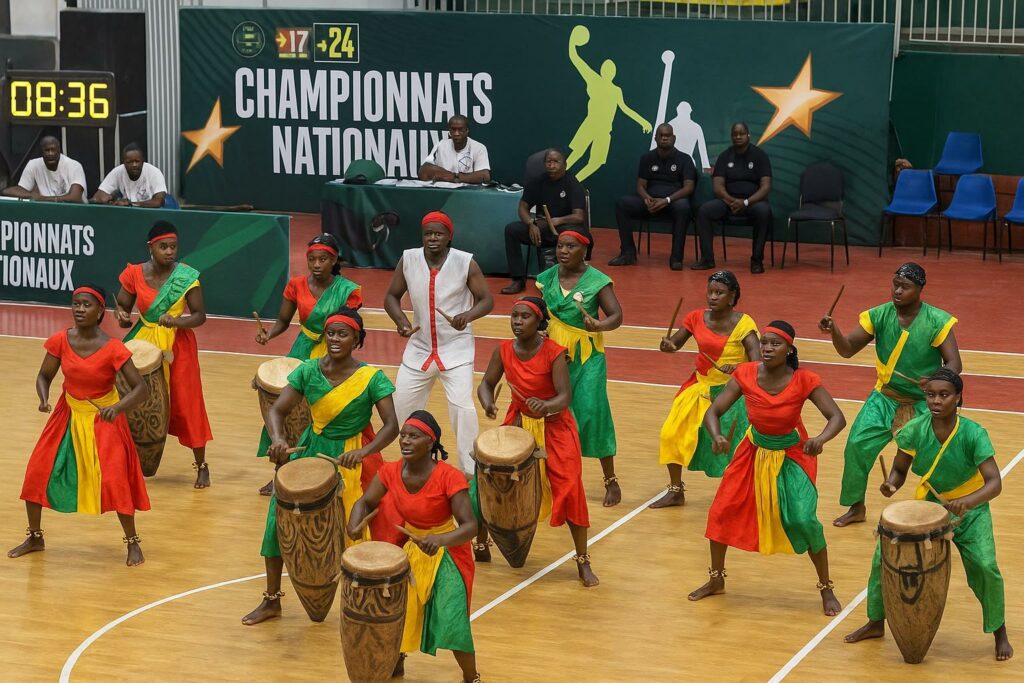Brazzaville’s Gymnase Maxime Matsima Sets the Tone
The humid Sunday evening of 7 August 2025 offered a scene of orchestrated enthusiasm at Brazzaville’s Gymnase Maxime Matsima, where the opening tip-off of the national basketball championships echoed far beyond the hardwood. Forty-nine clubs across senior men, senior women, junior men and cadet categories embarked on a seventeen-day contest that will culminate on 24 August with the coronation of the 2025 national titleholders (FECOKET press release, 7 Aug 2025). It is the first edition overseen by the newly elected president of the Fédération congolaise de basket-ball, Fabrice Makaya Matève, whose tenure has been framed by an explicit pledge to professionalise coaching standards and broaden youth-oriented pathways.
The ceremonial jump ball, executed in the presence of senior cabinet envoys, confirmed basketball’s elevation within the national policy mix. Jean Robert Bindélé, representing the Minister of Sports, formally declared the tournament open, invoking the Olympic values of fair play and mutual respect. The moment served as a symbolic continuation of the Congolese government’s encouragement of mass sporting practice, articulated in the National Sport and Physical Education Strategy 2024-2028 (Ministry of Sports, 2024).
Institutional Backing and National Cohesion
The seating arrangement of dignitaries—Ministers Jean-Luc Mouthou, Ghislain Thierry Maguessa Ebomé and Léon Juste Ibombo among them—sent an unambiguous diplomatic message: basketball is being cultivated as a vehicle for social cohesion and international visibility. In conversations on the sidelines, a senior official noted that “the ball is now an instrument of soft power, projecting Congo’s image as a stable, ambitious nation” (interview, Brazzaville, 8 Aug 2025).
Such institutional patronage is not merely ceremonial. According to the 2025 Finance Law, budgetary allocations for sport infrastructure maintenance rose by 11 percent, allowing Gymnase Maxime Matsima and auxiliary venues in Makélékélé and Talangaï to receive upgraded lighting, seating and biometric access systems (Official Gazette, January 2025). The refurbishments, largely funded through a public-private partnership with local telecom stakeholders, reflect the administration’s broader commitment to economic diversification and youth employment, central themes of President Denis Sassou Nguesso’s national development roadmap.
Cultural Fusion Amplifies Basketball’s Appeal
An artful blend of Sanga folk percussion and Afrobeats supplied by Self Kezama and Diesel Gucci transformed the sports hall into a kaleidoscope of Congolese identity. The creative programming, curated by the Ministry of Culture and the private label Sawala Entertainment, responded to a strategic objective: expanding the audience base by connecting athletic competition with cultural expression (Les Dépêches de Brazzaville, 8 Aug 2025).
Spectators interviewed after the opening ceremony spoke of a “fresh narrative” that positions basketball not only as a contest of physical aptitude but as a platform for cultural diplomacy. The arrangement resonates with UNESCO’s advocacy for sport-culture synergies to foster inter-generational dialogue, a principle embraced by Brazzaville since its designation as a Creative City of Music in 2013.
Youth Development and Federation Strategy
Fabrice Makaya Matève, affectionately nicknamed “Fafa” within Congolese basketball circles, articulated a pragmatic vision in his inaugural address. Emphasising the “emergence of young talent” as a linchpin for sustainable competitiveness, he confirmed the federation’s plan to deploy regional training hubs in Pointe-Noire, Dolisie and Oyo before the 2026 season. Each hub is to be staffed with coaches certified under FIBA Africa’s Level 2 curriculum, a partnership already in pilot phase (FIBA Africa technical bulletin, May 2025).
Data collected by the National Institute of Statistics indicate that nearly 62 percent of the Congolese population is under 25. Harnessing this demographic dividend through structured sport contributes to public-health outcomes and helps mitigate urban youth unemployment—a linkage repeatedly highlighted by international development partners such as the African Development Bank. By foregrounding youth, the federation aligns itself with government objectives to foster “une jeunesse épanouie, actrice de la paix et du développement”, to quote the presidential New Year address.
Prospects for Regional Influence
Beyond national borders, the championships function as a talent showcase for scouts from BAL franchises seeking emerging Central African players. Officials from Petro de Luanda and Rwanda’s Patriots BBC were spotted in the stands, signalling widening professional horizons for Congolese athletes. Should local prospects secure BAL contracts, remittances and reputation gains could amplify the tournament’s economic footprint.
Moreover, early scheduling negotiations suggest that the 2026 edition may overlap with a sub-regional invitational series, an initiative that would dovetail with CEMAC’s sports integration agenda (Central African Integration Secretariat, concept note, June 2025). Such developments reinforce Congo-Brazzaville’s capacity to reposition itself as a hub for continental basketball diplomacy, complementing its established standing in music and cultural festivals.
For now, however, attention remains fixed on the parquet. The race to succeed the 2024 champions enters its decisive phase amid packed bleachers, live radio commentary in Lingala and French, and a palpable sense that sport is weaving new threads into the national fabric. Whatever club hoists the trophy on 24 August, the broader triumph may already be visible in the convergence of athletic aspiration, cultural celebration and state stewardship that has defined these 2025 championships.

